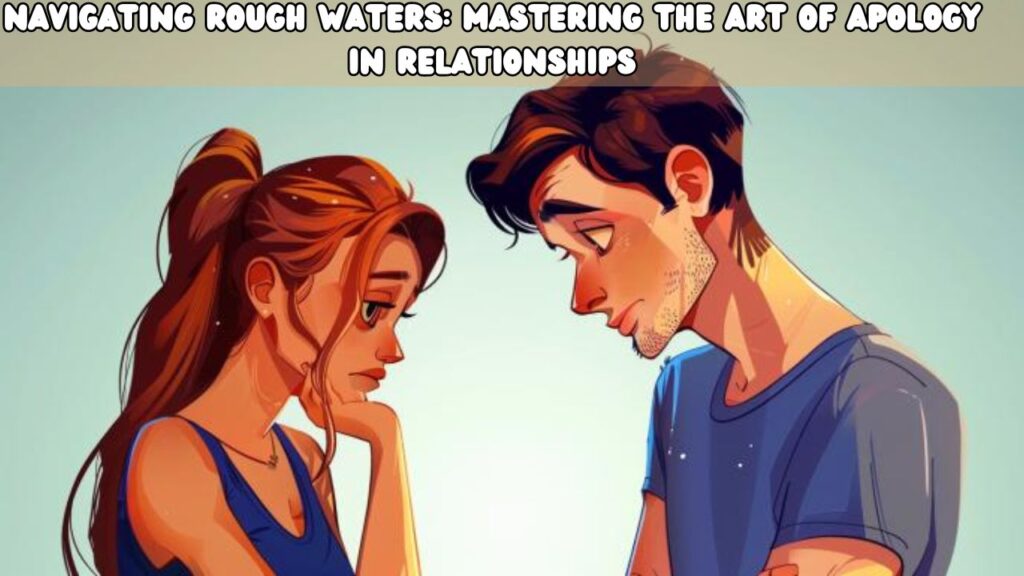Understanding the Impact: When Words and Actions Collide

Ahoy again, my intrepid navigators of the heart! As we sail further into the art of apology, it’s crucial to understand the turbulent waters where words and actions collide. Recognizing the impact of our deeds and the power of our words is akin to a captain respecting the sea’s hidden currents and the winds’ force. Let’s delve into the depths of this understanding, ensuring that our apologies can truly mend the sails of strained relationships.
Recognizing the Hurt
First and foremost, a successful apology begins with recognizing the hurt that our actions or words have caused. This isn’t just about acknowledging that the other person is upset; it’s about truly understanding the depth and breadth of the emotional impact your actions have caused. Whether it’s a careless comment or a significant letdown, each misstep can leave a mark on your partner’s emotional well-being. Recognizing this hurt is like spotting a storm on the horizon—necessary for navigating safely and avoiding further turmoil.
The Role of Empathy in Understanding Impact
Empathy is the compass that guides us in understanding the true impact of our actions. It involves putting yourself in your partner’s shoes and experiencing their emotions from their perspective. When you empathize, you not only grasp the pain they feel but also understand the context and the reasons why your actions were hurtful. This deep understanding is critical—it turns a basic acknowledgment into a meaningful connection, showing your partner that their feelings are important and that you genuinely care about restoring harmony.
How Unresolved Issues Can Escalate
Uncharted waters are dangerous, and similarly, unresolved issues in relationships can quickly escalate, turning minor squabbles into major conflicts. When apologies are absent or inadequate, hurt feelings can fester, leading to resentment and a buildup of emotional debris. This accumulation can darken the waters of your relationship, making navigation difficult. It’s like ignoring a small leak in your ship—it might not sink you today, but over time, it can lead to disaster.
Understanding the impact of your actions, employing empathy, and addressing issues promptly prevents these small leaks in your relationship from becoming catastrophic. Just as a skilled captain reads the signs of the sea, a thoughtful partner recognizes and responds to the emotional cues of their companion. As we continue to sail through the art of apology, remember that each step taken towards understanding and empathy not only repairs but also enriches the journey you share with your partner. Stay tuned, as we next explore how to craft your apology to ensure it reaches the shore of reconciliation.
Crafting Your Apology: More Than Just ‘I’m Sorry’

Ahoy, brave voyagers! As we navigate through the nuances of mending broken bonds, we reach the crucial stage of crafting our apology. It’s an art form, really, akin to charting a course through uncharted waters—requiring precision, understanding, and a keen awareness of the conditions. Remember, an apology is more than just uttering ‘I’m sorry’; it’s about crafting a message that heals. Let’s hoist the sails and dive into how to tailor an apology that not only resonates but also rebuilds trust.
Timing is Key
Just as in navigation, timing in apologies can mean the difference between smooth sailing and a stormy voyage. An apology should come at a time when both parties are calm enough to discuss the issue without heightened emotions clouding their judgment. Timing your apology can also show your sincerity—it demonstrates that you have taken the issue seriously and have not rushed to simply brush the issue under the deck. However, don’t let too much time pass, as delays can signal indifference. Finding the right moment to apologize shows your commitment to resolving the conflict and moving forward together.
Choosing the Right Words
The words you choose are the very planks of the bridge you are trying to rebuild. Thus, your apology must be clear, sincere, and devoid of any excuses. Avoid phrases that shift the blame, such as “I’m sorry you feel that way” or “I’m sorry if you were offended.” Instead, use language that accepts responsibility, such as “I’m sorry I hurt you by…” This shows that you own your actions and understand their effects. Your choice of words should reflect not only regret but also a resolve to avoid causing similar pain in the future. It’s about showing that you have reflected on your actions and have learned from them.
Acknowledging Feelings and Admitting Faults
A heartfelt apology will always include a genuine acknowledgment of the other person’s feelings and an admission of fault. Acknowledge the hurt your actions have caused and express genuine empathy for the pain felt by your partner. This can be the most challenging part of apologizing because it involves vulnerability. Admitting your faults openly reinforces the sincerity of your apology and shows your commitment to the relationship. This acknowledgment not only validates your partner’s feelings but also marks a crucial step in the healing process, laying down a solid foundation for rebuilding trust.
As we plot our course through the intricacies of a proper apology, remember that each word and action should contribute to a greater understanding and a stronger bond. Up next, we’ll explore how to listen and respond appropriately during these delicate dialogues, ensuring that the waters ahead are as clear and calm as possible.
Listening and Responding: The Other Side of Apology

Welcome back to the helm, navigators! As we continue our journey through the art of apology, it’s crucial to address the flip side of this process—listening and responding. This stage is like navigating through a narrow strait; it requires focus, attentiveness, and the ability to maneuver based on the feedback from the waters around you. Let’s set our course to ensure that our responses foster healing and understanding.
The Importance of Listening Actively
Active listening is the beacon that guides us through the fog of emotional turmoil. It involves more than just hearing words; it’s about understanding the underlying feelings and emotions conveyed. When you listen actively, you give your partner the space and respect they need to express themselves fully. This shows that you value their perspective and are genuinely interested in resolving the issue at hand. Remember, an apology without active listening is like a ship without a rudder—likely to go off course. By focusing fully on your partner’s words, you can grasp the complete scope of their feelings, which is essential for true reconciliation.
How to Respond to Feedback in the Moment
As your partner responds to your apology, it’s vital to stay present and engaged. Respond to their feedback with acknowledgments that show you are absorbing their words. Use phrases like “I understand why you feel that way,” or “Thank you for sharing that with me, I see how my actions affected you.” Avoid getting defensive or interrupting, which can signal that you are more interested in being right than in resolving the conflict. Instead, allow your partner to express all their thoughts and feelings. This approach not only helps in soothing hurt feelings but also empowers your partner to feel heard and respected, paving the way for a stronger, more resilient relationship.
Dealing with Rejection of Your Apology
Sometimes, despite your best efforts, your apology may not be accepted immediately—or at all. This rejection can be disheartening, but it’s important to handle it with grace and understanding. If your apology is not accepted, give your partner some space and time. Respect their feelings and let them know you are there when they are ready to engage again. Continue to show through your actions that you are committed to making amends and improving yourself. It’s like waiting for the storm to pass—it’s not about abandoning ship but about showing that you can stand steady, even in rough waters.
Navigating through listening and responding is critical in the art of apology. It ensures that the process is interactive and constructive, leading to a deeper understanding and strengthening of the relationship. As we sail forward, remember that each part of this journey is crucial in crafting a lasting bond, built on mutual respect and understanding. Stay tuned as we explore further into rebuilding trust and setting a course for a brighter future together.
Rebuilding Trust: The Journey Forward

Ahoy, steadfast companions! As we continue our voyage on the intricate seas of relationship recovery, we now focus on one of the most crucial aspects—rebuilding trust. After the storm of conflict has passed and apologies have been exchanged, the real work of constructing a sturdier ship begins. Trust is the keel of your relationship’s vessel; without it, navigating future waters can be perilous. Let’s delve into the steps required to fortify this essential element.
Steps to Rebuild Trust
Rebuilding trust is akin to repairing a treasured ship—both require time, effort, and careful attention to detail. Begin by consistently following through on your promises and commitments. Small, reliable actions over time are like the countless nails needed to strengthen the hull of a ship; they hold everything together. Communicate openly about your thoughts and feelings, and encourage your partner to do the same. Transparency is crucial, as it helps avoid misunderstandings that can lead you off course. Additionally, involve your partner in decisions that affect you both. This inclusion shows that you value their presence and perspective, reinforcing the trust that each decision is made with the best for both in mind.
Patience and Consistency in Actions
The path to regaining trust is not linear—it can be as unpredictable as the sea itself. It requires patience from both parties. Be patient with your partner and yourself as you navigate this recovery. Missteps may occur, but how you handle them can either mend or further strain the trust. Consistency in your actions plays a crucial role here; it demonstrates your commitment to change and to the relationship. Let your consistent actions be the steady winds that propel your ship forward, showing your partner that they can rely on your newfound course.
Celebrating Small Victories in Healing
On the journey to rebuilding trust, it’s important to recognize and celebrate the small victories. These are the moments when your efforts to improve communication pay off, when a promise kept adds another layer of assurance, or when a simple, daily act of kindness is acknowledged. Celebrating these victories can boost morale, just as a favorable wind can hasten a ship’s journey. It reinforces positive behaviors and highlights the progress being made, no matter how incremental it may seem. This practice not only fosters a positive environment but also reminds both partners of the progress that’s being made, encouraging continued effort and commitment.
As we chart this course of rebuilding trust, remember, it’s a voyage that requires time, dedication, and the willingness to work through difficulties together. Each step taken, no matter how small, is a crucial part of the journey. Keep your compass set on honesty, patience, and consistency, and you’ll find that the trust you rebuild is stronger and more resilient than ever. Now, let us set our sights on the horizon, where the future of your relationship grows brighter with each day sailed together.
Beyond the Apology: Preventing Future Conflicts

Ahoy once more, noble navigators of the relational seas! As we’ve patched up our ship and set a new course toward clearer skies and calmer waters, it’s time to ensure that future storms are fewer and far between. An apology is not just about fixing what went wrong; it’s about setting a course that avoids similar troubles ahead. Let’s explore the essential strategies to prevent misunderstandings, seek help when needed, and keep the fires of love and respect burning brightly in your actions.
Communication Skills to Prevent Misunderstandings
Effective communication is the beacon that guides ships safely past potential hazards. It involves more than just talking; it’s about ensuring that both parties understand each other clearly. To prevent future conflicts, practice active listening—pay close attention to what your partner says without planning your response while they speak. Validate their feelings, even if you don’t agree with their perspective, to show that you respect their point of view. Use “I” statements to express your feelings without blaming or accusing, such as saying, “I feel upset when…” instead of “You make me upset when…” This approach minimizes defensiveness and opens up a dialogue that promotes understanding and connection.
Knowing When to Seek Help (Couples Counseling)
Sometimes, even the most skilled sailors need to call on the expertise of a navigator, and similarly, there are times when a relationship can benefit from professional guidance. If conflicts continue to arise despite your best efforts, or if you feel that the issues are beyond what you can manage alone, it may be time to seek couples counseling. A professional counselor acts as a neutral third party who can help identify underlying issues that you might not be aware of and provide tools and strategies to resolve them. Think of it as bringing an expert aboard to help navigate through particularly tricky waters.
Keeping Love and Respect Alive in Your Actions
Maintaining love and respect in a relationship is about the everyday choices and actions that demonstrate these feelings. Show appreciation for your partner regularly, not just on special occasions. Simple gestures of kindness and consideration can go a long way in reinforcing the love and respect you share. Make it a practice to regularly spend quality time together, engaging in activities that both of you enjoy. This not only strengthens your bond but also creates positive memories that can serve as a buffer during tougher times. Additionally, continue to support your partner’s personal growth and successes. Celebrate their achievements and encourage their aspirations, showing that you value them not just as a partner but also as an individual.
As we navigate beyond the simple apology and look toward maintaining a peaceful and loving relationship, remember that every action you take builds on the foundation you’ve repaired. By cultivating robust communication skills, being open to professional help when needed, and continuously fostering love and respect, you ensure that your relationship not only survives but thrives. Keep your sails adjusted to the winds of harmony and understanding, and you’ll enjoy a voyage filled with shared adventures and mutual fulfillment. Happy sailing, my hearties!
Conclusion: Discovering New Horizons Together

Ahoy, my hearties! As we draw near the end of our voyage through the art of apology and relationship restoration, let’s take a moment to gaze back at the waters we’ve traversed. We’ve navigated through understanding the impact of our actions, crafting heartfelt apologies, listening actively, and rebuilding the trust that fortifies our relational ships. As your Captain Connexion, I’m heartened by the journey we’ve shared and excited about the new horizons that await us. Let us recap the treasures we’ve discovered and chart the course for continued growth and adventure in our relationships.
Recap of the Key Points on Effective Apologizing
We’ve learned that an effective apology is much more than a simple “I’m sorry.” It’s about recognizing the hurt, empathizing with the affected party, choosing our words carefully, and acknowledging our faults sincerely. Timing our apology properly, responding to feedback constructively, and dealing with possible rejection gracefully are all part of the process. We must remember that our apologies should be clear beacons of our intent to mend and improve, not just placate.
Encouragement for Ongoing Personal Growth
The journey doesn’t end with the apology or even the resolution of a conflict. True navigators of the heart know that relationship-building is an ongoing adventure—one that requires continual personal growth. Encourage each other to learn from each experience, to develop better communication skills, and to deepen your understanding of one another. Embrace the challenges as opportunities to strengthen your bond and expand your horizons. Personal growth is not just about improving yourself; it’s about evolving together, enhancing your capacity to love, understand, and support each other through calm and stormy seas alike.
The Ongoing Adventure of Relationship-Building
Remember, mates, the building of a relationship is an infinite voyage, not a destination. Each day presents new opportunities to show love, respect, and gratitude—to sail beyond the familiar coasts into deeper and more enchanted waters. Celebrate the small victories, learn from the losses, and always keep the channel of communication open and active. Your relationship is a living, breathing entity that thrives on mutual effort, commitment, and adventure.
As we lower the anchor on our journey today, I urge you to carry forward the lessons learned with a spirit of optimism and commitment. Whether you’re navigating smooth seas or facing turbulent tides, remember that every challenge is a chance to discover new strengths and deepen your bonds. Keep your eyes on the horizon, your hands steady on the wheel, and your heart open to the endless possibilities of love and connection. Until we meet again on these digital seas, keep sailing forward, together.









You may like
Balancing Career and Relationship Goals: A Guide to Harmonious Living
The Impact of Childhood Experiences on Adult Relationships
Setting Boundaries in Romantic Relationships: A Path to Healthy Love